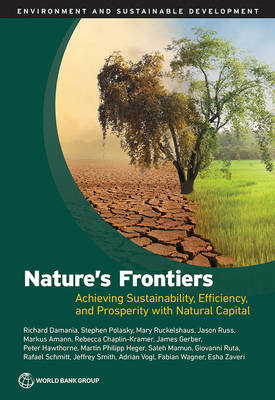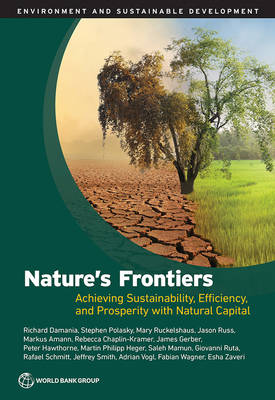
- Afhalen na 1 uur in een winkel met voorraad
- Gratis thuislevering in België vanaf € 30
- Ruim aanbod met 7 miljoen producten
- Afhalen na 1 uur in een winkel met voorraad
- Gratis thuislevering in België vanaf € 30
- Ruim aanbod met 7 miljoen producten
Zoeken
Nature's Frontiers
Achieving Sustainability, Efficiency, and Prosperity with Natural Capital
Richard Damania, Stephen Polasky, Mary Ruckelshaus, Jason Russ, Markus Amann, Rebecca Chaplin-Kramer, James Gerber, Peter Hawthorne, Martin Philipp Heger, Saleh Mamun, Giovanni Ruta, Rafael Schmitt, Jeffrey Smith, Adrian Vogl, Fabian Wagner, Esha Zaveri
€ 73,45
+ 146 punten
Omschrijving
The great expansion of economic activity since the end of World War II has caused an unprecedented rise in living standards, but it has also caused rapid changes in earth systems. Nearly all types of natural capital--the world's stock of resources and services provided by nature--are in decline. Clean air, abundant and clean water, fertile soils, productive fisheries, dense forests, and healthy oceans are critical for healthy lives and healthy economies. Mounting pressures, however, suggest that the trend of declining natural capital may cast a long shadow into the future. Nature's Frontiers: Achieving Sustainability, Efficiency, and Prosperity with Natural Capital presents a novel approach to address these foundational challenges of sustainability. A methodology combining innovative science, new data sources, and cutting-edge biophysical and economic models builds sustainable resource efficiency frontiers to assess how countries can sustainably use their natural capital more efficiently. The analysis provides recommendations on how countries can better use their natural capital to achieve their economic and environ mental goals. The report indicates that significant efficiency gaps exist in nearly every country. Closing these gaps can address many of the world's pressing economic and environmental problems--economic productivity, health, food and water security, and climate change. Although the approach outlined in this report will entail demanding policy reforms, the costs of inaction will be far higher.
Specificaties
Betrokkenen
- Auteur(s):
- Uitgeverij:
Inhoud
- Aantal bladzijden:
- 216
- Taal:
- Engels
- Reeks:
Eigenschappen
- Productcode (EAN):
- 9781464819230
- Verschijningsdatum:
- 14/04/2023
- Uitvoering:
- Paperback
- Formaat:
- Trade paperback (VS)
- Afmetingen:
- 152 mm x 229 mm
- Gewicht:
- 408 g

Alleen bij Standaard Boekhandel
+ 146 punten op je klantenkaart van Standaard Boekhandel
Beoordelingen
We publiceren alleen reviews die voldoen aan de voorwaarden voor reviews. Bekijk onze voorwaarden voor reviews.







